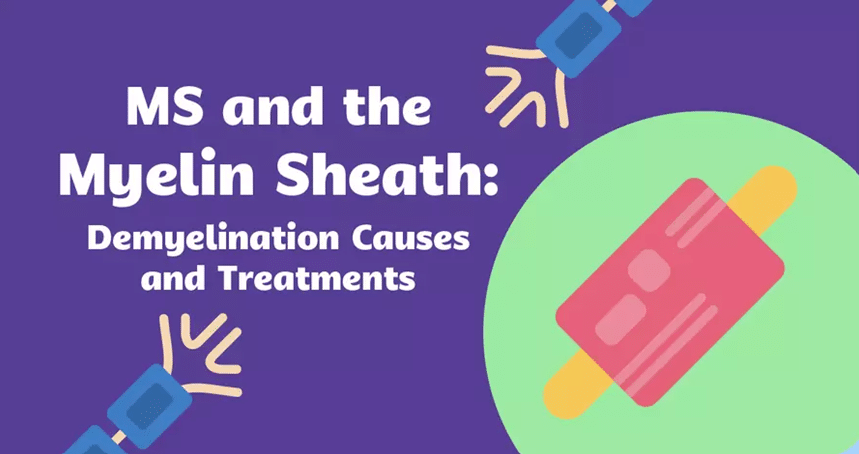
Medically reviewed by Barry Singer, M.D. / Written by Daniel Bukszpan
What role does myelin damage play in the MS disease course? To learn more, MyMSTeam talked to Dr. Barry Singer, director and founder of The MS Center for Innovations in Care at Missouri Baptist Medical Center in St. Louis. His award-winning MS website, MS Living Well, started in 2007 and has been a valuable resource in more than 190 countries. He’s also the host of the MS Living Well podcast, including the episode “Remyelination: Repairing Multiple Sclerosis.”
What Is Myelin?
Myelin protects axons in the CNS. Axons are extensions of individual neurons (nerve cells), which allow them to communicate with other cells. Most axons are protected by myelin, similar to how electrical wire is protected by its coating.
The transmission of nerve signals allows your body to carry out normal functions without your having to think about it. This includes seeing, hearing, and controlling bodily functions.
Researchers believe that in MS, the immune system responds abnormally, producing inflammation in the CNS. This inflammation then damages both myelin and oligodendrocytes, the cells that create myelin.
Does Myelin Damage Lead to MS Symptoms?
Myelin damage in MS can result in lesions and scar tissue on nerves, which can slow or even stop nerve signals from reaching the rest of the body. This can cause MS symptoms.
Myelin damage can slow or even stop nerve signals from reaching the rest of the body, causing MS symptoms.
People with MS most often have a relapsing-remitting disease course — they experience periods of new or worsening symptoms (called flares), alternating with periods of remission, when symptoms fade or disappear. Other types of disease courses include primary progressive MS and secondary progressive MS. These types of MS worsen gradually over time without periods of remission.
Does Myelin Damage Cause Disease Progression?
Although there’s evidence that suggests demyelination plays a role in how MS progresses, some researchers argue that more research is necessary to know for certain. Myelin plays an important role in keeping axons healthy. Loss of myelin may make neurons more vulnerable to injury over time, leading to progressive disease. When a person loses axons more quickly than their CNS can compensate for the damage, they may transition from relapsing-remitting MS to progressive MS.
Do MS Treatments Address Myelin Damage?
Some DMTs have shown that they’re capable of slowing down the rate of brain shrinkage and damage, Dr. Singer said. Although a degree of brain shrinkage is an inevitable part of getting older, MS can speed up the process. DMTs could help guard against that shrinkage, he noted. DMTs can also prevent new relapses.
“They prevent disability progression over time, so a group of people on a placebo would progress more rapidly than people on a drug,” Dr. Singer said. “They prevent future disease activity.”
Although DMTs have proven effective, they can’t reverse MS: People who’ve lost function due to MS won’t get it back through the use of DMTs, Dr. Singer added. “Unfortunately, these disease-modifying therapies aren’t going to bring back old function,” he said. “They are not repair drugs.”
Some people who take these drugs have difficulty sticking to their treatment, Dr. Singer said. Sometimes people stop taking these drugs because, when they don’t see a reversal in their symptoms, they assume the medications aren’t working. However, it’s vital that people with MS understand that these medicines are meant to prevent future damage, not reverse existing symptoms by creating new myelin, he said.
A 2022 study of 279 people with MS found that those who stuck with their treatments had a significantly higher life expectancy than those who did not.
It’s vital that people with MS understand that DMTs are meant to prevent future damage, not reverse existing symptoms by creating new myelin.
“Unfortunately, we do have patients as they age who have had a lot of disease in their spinal cord or brain, and they start to have cognitive problems and more balance problems,” Dr. Singer said. “They feel like they’re getting worse despite treatment — but I think off of disease-modifying therapies, things may be getting worse a lot faster.”
Many people with MS also switch treatments if they feel a DMT isn’t working well for them.
Dr. Singer explained that in addition to taking DMTs, people with MS can practice healthy behaviors on their own to keep their physical and cognitive states as sharp as possible. He recommends:
- Getting an adequate level of vitamin D
- Exercising
- Getting enough sleep
- Keeping your mind active
All these activities have proven benefits. “Brain health is really important,” Dr. Singer said. “Exercise has been shown to help keep your brain reserves healthy.”

Stay informed with MS news and information - Sign-up here
For MS patients, caregivers or clinicians, Care to chat about MS? Join Our online COMMUNITY CHAT



